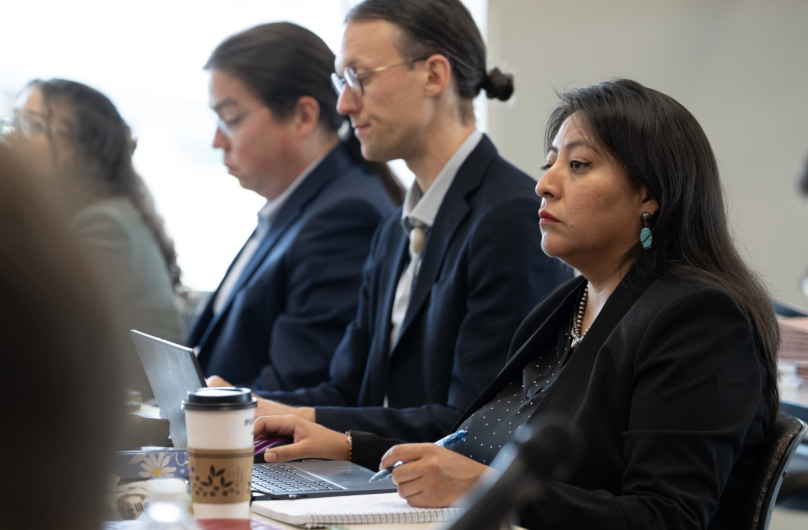
- Details
- By Kaili Berg
On Wednesday, September 3, testimony opened in the contested case challenging Wisconsin’s approval of permits for Enbridge Energy’s controversial Line 5 pipeline reroute.
At issue are permits granted last November by the Wisconsin Department of Natural Resources (DNR), which authorized the Canadian oil giant to clear trees, blast through bedrock, trench across wetlands, and dig through waterways to build a new 41-mile segment of pipeline through northern Wisconsin.
Geologist William Joseph Bonin told the administrative law judge that the DNR failed to properly evaluate how construction could damage fragile groundwater systems.
“Blasting is going to have a larger impact than the expert reports discussed and the reason for that is the already fractured bedrock was not taken into consideration in the reports,” Bonin stated. “The effects of blasts, especially on fracture networks, may be permanent.
Bonin criticized Enbridge’s geological borings along the pipeline path as “inadequate,” noting too few samples were taken and that some drilling data was incomplete or contradictory.
He testified that some borings were cut short because of artesian conditions, where groundwater was actively flowing upward, with no follow-up testing.
“I think that the risks of Horizontal Directional Drilling were understated and that the site analyses were not done appropriately for the glacial geology and fractured rock conditions,” Bonin said.
Members of the public also testified, including UW–Madison graduate student Tabitha Faber, who highlighted threats to wildlife and habitat she observed near the proposed construction zone.
“The proposed reroute will cross over 100 waterways, including Class 1 trout streams that are safe havens for hundreds of wetland species, including those threatened and endangered by construction projects just like this one,” Faber told the court.
The contested case is the latest chapter in the long legal battle over Line 5, a 72-year-old pipeline that carries crude oil and natural gas liquids from Superior, Wisconsin, through Michigan, to refineries in Sarnia, Ontario.
The Bad River Band of Lake Superior Chippewa sued Enbridge in 2019, arguing that the company was trespassing on its Reservation lands. In 2023, a federal judge agreed, ordering Enbridge to remove the pipeline from the Reservation by June 2026.
Rather than shut down the aging line, Enbridge is seeking to reroute it around the Reservation. The proposed 41-mile replacement segment would cut across more than 200 waterbodies and over 100 wetlands, raising concerns about long-term harm to water quality, wetlands, and wild rice beds that hold deep cultural significance for the Band.
According to Enbridge’s own expert, shutting down Line 5 would have little to no impact on gas prices in Wisconsin.
Enbridge must still secure federal permits from the U.S. Army Corps of Engineers before any construction can begin.
For now, work is on hold while the contested case plays out. Testimony is scheduled to continue Friday, September 5, at 9 a.m. at the Hill Farms State Office Building in Madison.
More Stories Like This
Feds release draft long-term plans for Colorado River managementApache Leader Walks 60 Miles to Court Hearing That Will Decide Fate of Sacred Oak Flat
Rappahannock Tribe Raises Sovereignty and Environmental Concerns Over Caroline County Water Permit
Klamath Indigenous Land Trust Purchases 10,000 Acres as Salmon Return
Trump signs law that revokes some limits on drilling in Alaska’s National Petroleum Reserve
Help us defend tribal sovereignty.
At Native News Online, our mission is rooted in telling the stories that strengthen sovereignty and uplift Indigenous voices — not just at year’s end, but every single day.
Because of your generosity last year, we were able to keep our reporters on the ground in tribal communities, at national gatherings and in the halls of Congress — covering the issues that matter most to Indian Country: sovereignty, culture, education, health and economic opportunity.
That support sustained us through a tough year in 2025. Now, as we look to the year ahead, we need your help right now to ensure warrior journalism remains strong — reporting that defends tribal sovereignty, amplifies Native truth, and holds power accountable.
 The stakes couldn't be higher. Your support keeps Native voices heard, Native stories told and Native sovereignty defended.
The stakes couldn't be higher. Your support keeps Native voices heard, Native stories told and Native sovereignty defended.
Stand with Warrior Journalism today.
Levi Rickert (Potawatomi), Editor & Publisher


